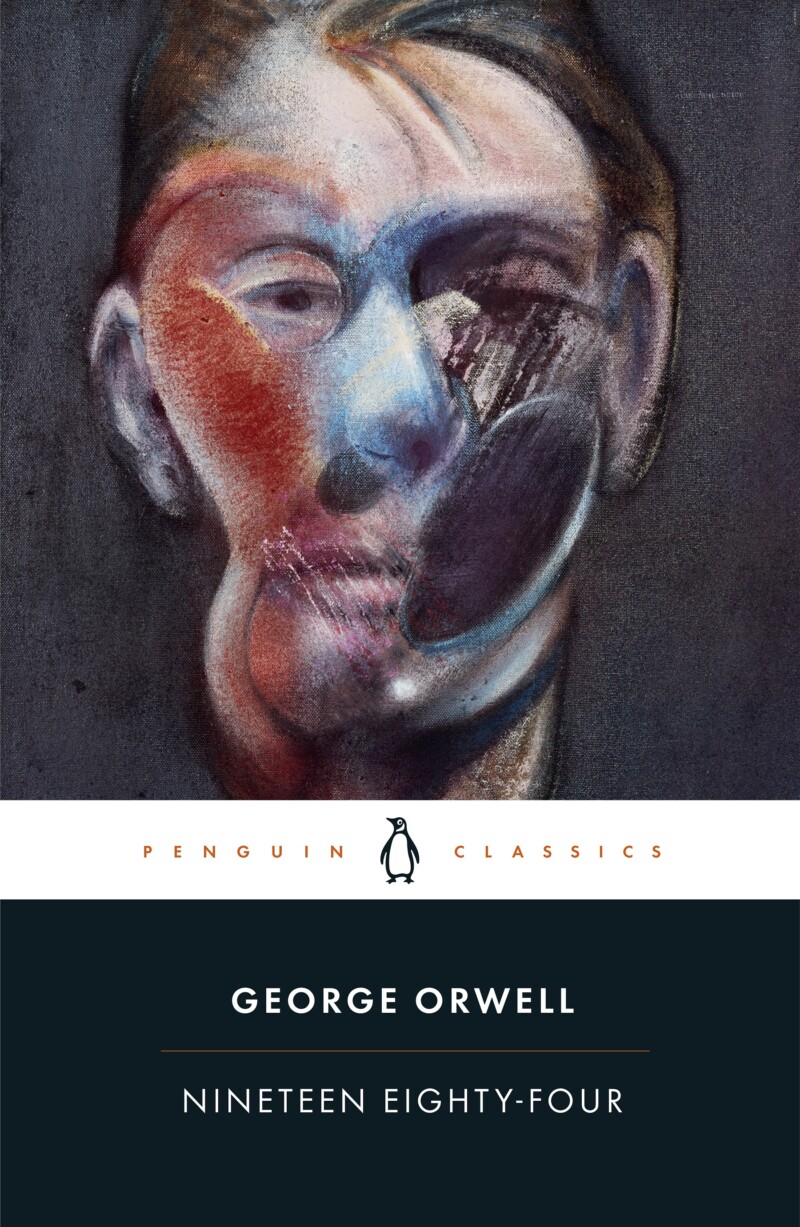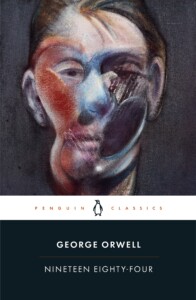Themes and Topics in Nineteen Eighty-Four

Share this
2019 marks the 70th anniversary of the first publication of George Orwell’s dystopian novel Nineteen Eighty-Four.
This blog looks at some of the themes in the novel.
State Surveillance
From the two-way telescreens to the enormous posters of Big Brother on every building, the population of Oceania lives under near constant surveillance. Big Brother’s eyes even seem to follow Winston from the coins he holds in his hand. This is not just a question of seeing how people behave and what they say. The Thought Police is ever vigilant in rooting out internalised dissent and deviation. ‘Nothing was your own except for the few cubic centimetres inside your skull’ and even this wasn’t safe from intrusion.
Winston knows he is doomed because:
‘Whether he wrote DOWN WITH BIG BROTHER, or whether he refrained from writing it, made no difference . . . He had committed – would still have committed, even if he had never set pen to paper – the essential crime that contained all others in itself. Thoughtcrime, they called it. Thoughtcrime was not a thing that could be concealed for ever. You might dodge it successfully for a while, even for years, but sooner or later they were bound to get you.’
Memories and the Past
At the Ministry of Truth, Winston’s job is to ‘rectify’ items in back numbers of the Times to reflect the state’s present situation and Party thinking. The written messages that contain his instructions are deposited in a slit nick-named ‘the memory hole’ once the task is complete. No record of the original edition of the Times is retained. This is a process of ‘continuous alteration’ that also covers books, magazines, leaflets, posters, films; anything ‘that might conceivably hold any political or ideological significance’. The past is abolished, starting from yesterday: ‘All history was a palimpsest, scraped clean and re-inscribed exactly as often as was necessary.’
By rewriting the past and destroying any evidence that might back up fragments of individual memories, the Party can control the present. Winston tries ‘to think his way backward into the dim period of his early childhood’, but ‘It was extraordinarily difficult. Beyond the late ‘fifties everything faded. When there were no external records that you could refer to, even the outline of your own life lost its sharpness’.
Controlling the past also controls the future. Winston reflects: ‘How could you appeal to the future when not a trace of you, not even an anonymous word scribbled on a piece of paper, could physically survive?’
Power through Language
Language is a vehicle of thought and so Ingsoc devises a new language that cuts away what are considered the wastage of unnecessary verbs, adjectives and nouns. Mainly used in internal memos in 1984, it is intended that Newspeak will have replaced the pre-Revolutionary Oldspeak in both written and spoken communication by 2050.
Syme, Winston’s ‘venomously orthodox’ colleague at the Ministry of Truth, is an authority on Newspeak. He says:
‘You think, I dare say, that our chief job is inventing new words. But not a bit of it! We’re destroying words – scores of them, hundreds of them, every day. We’re cutting language to the bone . . . In the end the whole notion of goodness and badness will be covered by only six words – in reality, only one word. Don’t you see the beauty of that, Winston? . . . Don’t you see that the whole aim of Newspeak is to narrow the range of thought? In the end we shall make thoughtcrime literally impossible, because there will be no words in which to express it.’
He continues: ‘Orthodoxy means not thinking – not needing to think. Orthodoxy is unconsciousness.’
Winston also reflects on the use of language when listening to the stream of words coming out of the mouth of a Party enthusiast and realising ‘it was not speech in the true sense: it was a noise uttered in unconsciousness, like the quacking of a duck’.
Doublethink
In Oceania, ‘doublethink’ is the Newspeak term for ‘reality control’. The definition includes:
‘To know and not to know, to be conscious of complete truthfulness while telling carefully-constructed lies, to hold simultaneously two opinions which cancelled out, knowing them to be contradictory and believing in both of them […]’
It is doublethink that enables people people like Symes to reconcile the announcements that come out of the Ministry of Plenty: yesterday the chocolate ration was reduced to 20 grammes a week, but today we celebrate the fact it’s been raised to 20 grammes a week.
Sex and Love
Controlling desire is another means of brainwashing employed by the Party. One of the first things Winston notices about Julia is the ‘narrow scarlet sash, emblem of the Junior Anti-Sex League’ which is wound ‘just tightly enough to bring out the shapeliness of her hips’.
‘The aim of the Party was not merely to prevent men and women from forming loyalties which it might not be able to control. Its real, undeclared purpose was to remove all pleasure from the sexual act . . . Sexual intercourse was to be looked on as a slightly disgusting minor operation, like having an enema.’
Winston refers to ‘the locked loneliness in which one had to live’, denied real friendships, love and commitment. After his love-less marriage to a Party zealot and before his affair with Julia, he had risked visiting a prole prostitute, which proved a traumatic experience that he records in his diary as a confession. To receive a note from Julia saying ‘I love you’ ignites ‘the desire to stay alive . . . and the taking of minor risks suddenly seemed stupid’. When they have their first proper meeting: ‘Their embrace had been a battle, the climax a victory. It was a blow struck against the Party. It was a political act’. Unlike Winston, Julia ‘had grasped the inner meaning of the Party’s sexual puritanism . . . sexual privation induced hysteria, which was desirable because it could then be transformed into war-fever and leader-worship’.
The Family and Children
The Parsons are depicted as a typical Oceanian family, with the helpless frightened wife and bumptious husband. The children clamour to be taken to watch the hanging of war criminals and Winston recognises the underlying viciousness in their games. Winston thinks ‘Nearly all children nowadays were horrible . . . ungovernable little savages’. ‘The only recognised purpose of marriage was to beget children for the service of the Party’ and there is talk that in the future all children will be ‘begotten by artificial insemination . . . and brought up in public institutions’.
‘All their ferocity was turned outwards, against the enemies of the State, against foreigners, traitors, saboteurs, thought-criminals. It was almost normal for people over thirty to be frightened of their own children . . . The family had become in effect an extension of the Thought Police. It was a device by means of which everyone could be surrounded night and day by informers who knew him intimately.’
Winston realises that his own family’s tragedy is no longer possible as it belonged to a time ‘when there was still privacy, love and friendship, and when the members of a family stood by one another without needing to know the reason’.
